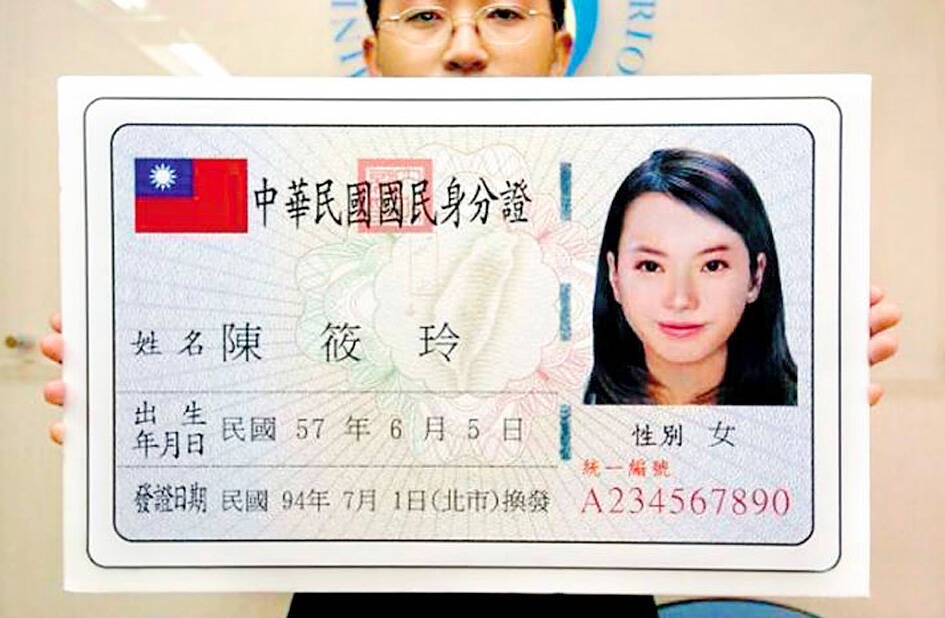The Ministry of the Interior has banned the use of mirror photos on national identification cards.
Taiwanese nationals were required to prepare a front-facing “half-body” color photo or digital photo taken within the past two years when applying for an identification card for the first time,
However, the ministry has since removed the term “half-body” in the updated regulation due to complaints regarding its vagueness.

Photo: Taipei Times
Published on Tuesday last week, the amended regulation on the formats and photos of national identification cards includes the stipulation that the length of the portrait from the top of the head to the bottom of the chin should be between 3.2cm and 3.6cm.
Composite photos and mirror photos — where the portrait’s left and right sides are reversed — are also prohibited, the regulation says.
It said that people should continue to use their original identification card number when restoring household registration, re-registering after canceling birth registration, and when being approved to reside domestically after canceling or abolishing initial household registration or restoring citizenship.
Those who re-register with different identities should be assigned a new identification card number, the updated regulation showed.
Those who are wanted, detained, or restricted from leaving the country in accordance with the Immigration Act (入出國及移民法) are banned from applying to change their national identification card numbers, it said.
The ban also applies to those who have been sentenced to a prison term and have not been declared eligible for probation or allowed to commute the sentence to a fine or community service, it said. The ban is valid for three years onward from the date of sentencing.
When same-sex married couples adopt their partner’s children through step-parent adoption or co-adopt children, the parents should not be marked as “adopted” on the children’s national identification cards, it said.

Taiwan has received more than US$70 million in royalties as of the end of last year from developing the F-16V jet as countries worldwide purchase or upgrade to this popular model, government and military officials said on Saturday. Taiwan funded the development of the F-16V jet and ended up the sole investor as other countries withdrew from the program. Now the F-16V is increasingly popular and countries must pay Taiwan a percentage in royalties when they purchase new F-16V aircraft or upgrade older F-16 models. The next five years are expected to be the peak for these royalties, with Taiwan potentially earning

STAY IN YOUR LANE: As the US and Israel attack Iran, the ministry has warned China not to overstep by including Taiwanese citizens in its evacuation orders The Ministry of Foreign Affairs (MOFA) yesterday rebuked a statement by China’s embassy in Israel that it would evacuate Taiwanese holders of Chinese travel documents from Israel amid the latter’s escalating conflict with Iran. Tensions have risen across the Middle East in the wake of US and Israeli airstrikes on Iran beginning Saturday. China subsequently issued an evacuation notice for its citizens. In a news release, the Chinese embassy in Israel said holders of “Taiwan compatriot permits (台胞證)” issued to Taiwanese nationals by Chinese authorities for travel to China — could register for evacuation to Egypt. In Taipei, the ministry yesterday said Taiwan

Taiwan is awaiting official notification from the US regarding the status of the Agreement on Reciprocal Trade (ART) after the US Supreme Court ruled US President Donald Trump's global tariffs unconstitutional. Speaking to reporters before a legislative hearing today, Premier Cho Jung-tai (卓榮泰) said that Taiwan's negotiation team remains focused on ensuring that the bilateral trade deal remains intact despite the legal challenge to Trump's tariff policy. "The US has pledged to notify its trade partners once the subsequent administrative and legal processes are finalized, and that certainly includes Taiwan," Cho said when asked about opposition parties’ doubts that the ART was

If China chose to invade Taiwan tomorrow, it would only have to sever three undersea fiber-optic cable clusters to cause a data blackout, Jason Hsu (許毓仁), a senior fellow at the Hudson Institute and former Chinese Nationalist Party (KMT) legislator, told a US security panel yesterday. In a Taiwan contingency, cable disruption would be one of the earliest preinvasion actions and the signal that escalation had begun, he said, adding that Taiwan’s current cable repair capabilities are insufficient. The US-China Economic and Security Review Commission (USCC) yesterday held a hearing on US-China Competition Under the Sea, with Hsu speaking on